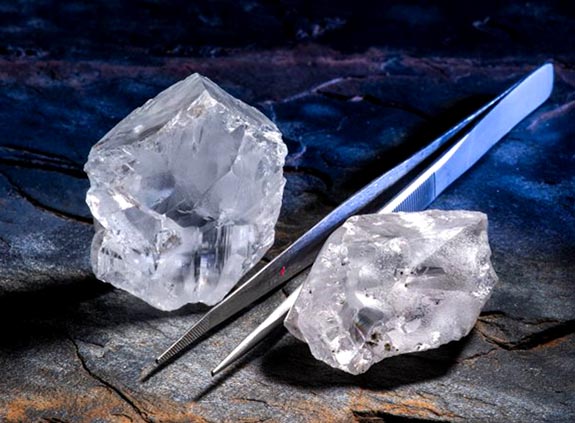Petra Diamonds Invests $289MM to Extend Life of Two Prolific South African Mines
Petra Diamonds announced that it will be investing $289 million to extend the productive lives of its Cullinan and Finsch mines in South Africa. The mines will be turning out high-value rough gems until 2030 and beyond, according to the mining company.

The Cullinan Diamond Mine, which has been operating continuously since 1902, is responsible for producing six of the world’s largest 50 diamonds based on carat weight. These include the The Legacy of the Cullinan Diamond Mine (#45, 424.89 carats, 2019), an unnamed diamond (#39, 460.2 carats, 2009), Cullinan Heritage (#32, 507 carats, 2009), Centenary (#27, 599 carats, 1986), The Golden Jubilee (#15, 755 carats, 1985) and the granddaddy of them all — the Cullinan Diamond (#1, 3,106 carats, 1905).
The Cullinan Diamond was eventually segmented into 105 faceted gems, two of which became part of the British Crown Jewels. These included the Great Star of Africa (Cullinan I) at 530.4 carats and the Second Star of Africa (Cullinan II) at 317.4 carats.
The Cullinan mine is also the world's only significant source of high-quality blue diamonds. Just last week, we wrote about a super-rare 39.34-carat blue rough diamond unearthed in 2021 at Cullinan that has since been transformed into a 15.10-carat, step-cut, fancy vivid blue diamond. That gem is expected to sell for $48 million or more at an upcoming Sotheby's auction.
Opened in 1967, Finsch is South Africa’s second-largest diamond operation by volume and is known for generating a steady supply of 50-plus-carat stones, as well as highly commercial goods of 5-plus-carats.
Petra said that $173 million will be allocated to the Cullinan mine, while $216 million will be earmarked for the Finch mine. Although these investments will extend the life of the mines to 2031 and 2030, respectively, Petra said both mines have the potential to be productive for much longer.
The Cullinan mine in the Gauteng Province of South Africa has a current depth of 880 meters, but Petra projects that high-quality diamonds will be found as deep as 1,073 meters. The mine's life could extend 50 years or more.
The Finsch mine in Northern Cape Province, South Africa, has a current depth of 700 meters, but diamond resources are present as deep as 1,000 meters. Petra projects that the mine's potential life could extend 25-plus years.
Interestingly, the size of the kimberlite pipe at the surface of the Cullinan mine is more than 75% larger than that of the Finsch mine. The Cullinan's surface pipe spans 32 hectares, while the Finsch's pipe spans 18 hectares. A hectare is equivalent to 100 square meters or 2.47 acres.
The Cullinan Diamond Mine was previously called the The Premier Mine, but took on its new moniker in celebration of its 100th anniversary in November of 2003. The mine was established in 1902, but mining operations didn't commence until 1903.
In 2008, Petra led a consortium that acquired the Cullinan diamond mine from De Beers Consolidated Mines.
Credit: Photo of 424.89-carat and 209.2-carat D-color diamonds recovered at Cullinan in March and April of 2019 courtesy of Petra Diamonds.

The Cullinan Diamond Mine, which has been operating continuously since 1902, is responsible for producing six of the world’s largest 50 diamonds based on carat weight. These include the The Legacy of the Cullinan Diamond Mine (#45, 424.89 carats, 2019), an unnamed diamond (#39, 460.2 carats, 2009), Cullinan Heritage (#32, 507 carats, 2009), Centenary (#27, 599 carats, 1986), The Golden Jubilee (#15, 755 carats, 1985) and the granddaddy of them all — the Cullinan Diamond (#1, 3,106 carats, 1905).
The Cullinan Diamond was eventually segmented into 105 faceted gems, two of which became part of the British Crown Jewels. These included the Great Star of Africa (Cullinan I) at 530.4 carats and the Second Star of Africa (Cullinan II) at 317.4 carats.
The Cullinan mine is also the world's only significant source of high-quality blue diamonds. Just last week, we wrote about a super-rare 39.34-carat blue rough diamond unearthed in 2021 at Cullinan that has since been transformed into a 15.10-carat, step-cut, fancy vivid blue diamond. That gem is expected to sell for $48 million or more at an upcoming Sotheby's auction.
Opened in 1967, Finsch is South Africa’s second-largest diamond operation by volume and is known for generating a steady supply of 50-plus-carat stones, as well as highly commercial goods of 5-plus-carats.
Petra said that $173 million will be allocated to the Cullinan mine, while $216 million will be earmarked for the Finch mine. Although these investments will extend the life of the mines to 2031 and 2030, respectively, Petra said both mines have the potential to be productive for much longer.
The Cullinan mine in the Gauteng Province of South Africa has a current depth of 880 meters, but Petra projects that high-quality diamonds will be found as deep as 1,073 meters. The mine's life could extend 50 years or more.
The Finsch mine in Northern Cape Province, South Africa, has a current depth of 700 meters, but diamond resources are present as deep as 1,000 meters. Petra projects that the mine's potential life could extend 25-plus years.
Interestingly, the size of the kimberlite pipe at the surface of the Cullinan mine is more than 75% larger than that of the Finsch mine. The Cullinan's surface pipe spans 32 hectares, while the Finsch's pipe spans 18 hectares. A hectare is equivalent to 100 square meters or 2.47 acres.
The Cullinan Diamond Mine was previously called the The Premier Mine, but took on its new moniker in celebration of its 100th anniversary in November of 2003. The mine was established in 1902, but mining operations didn't commence until 1903.
In 2008, Petra led a consortium that acquired the Cullinan diamond mine from De Beers Consolidated Mines.
Credit: Photo of 424.89-carat and 209.2-carat D-color diamonds recovered at Cullinan in March and April of 2019 courtesy of Petra Diamonds.

